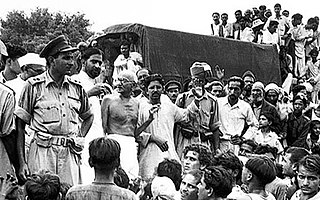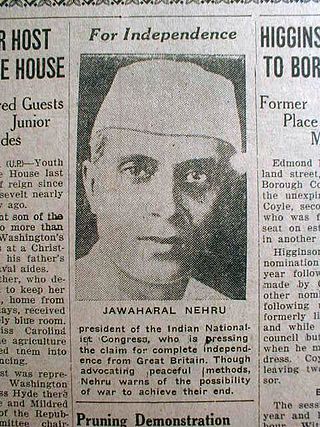Non-cooperation movement may refer to:
- Non-cooperation movement (1919–1922), during the Indian independence movement, lead by Mahatma Gandhi against British rule
- Non-cooperation movement (1971), a movement in East Pakistan
Non-cooperation movement may refer to:

Mohandas Karamchand Gandhi was an Indian lawyer, anti-colonial nationalist and political ethicist who employed nonviolent resistance to lead the successful campaign for India's independence from British rule. He inspired movements for civil rights and freedom across the world. The honorific Mahātmā, first applied to him in South Africa in 1914, is now used throughout the world.
Civil disobedience is the active, professed refusal of a citizen to obey certain laws, demands, orders or commands of a government. By some definitions, civil disobedience has to be nonviolent to be called "civil". Hence, civil disobedience is sometimes equated with peaceful protests or nonviolent resistance.

Satyāgraha, or "holding firmly to truth", or "truth force", is a particular form of nonviolent resistance or civil resistance. Someone who practises satyagraha is a satyagrahi.

The non-cooperation movement was a political campaign launched on August 1, 1920, by Mahatma Gandhi to have Indians revoke their cooperation from the British government, with the aim of persuading them to grant self-governance.

The Salt march, also known as the Salt Satyagraha, Dandi March, and the Dandi Satyagraha, was an act of nonviolent civil disobedience in colonial India, led by Mahatma Gandhi. The 24-day march lasted from 12 March 1930 to 6 April 1930 as a direct action campaign of tax resistance and nonviolent protest against the British salt monopoly. Another reason for this march was that the Civil Disobedience Movement needed a strong inauguration that would inspire more people to follow Gandhi's example. Gandhi started this march with 78 of his trusted volunteers. The march spanned 387 kilometres (240 mi), from Sabarmati Ashram to Dandi, which was called Navsari at that time. Growing numbers of Indians joined them along the way. When Gandhi broke the British Raj salt laws at 8:30 am on 6 April 1930, it sparked large-scale acts of civil disobedience against the salt laws by millions of Indians.

The Anarchical and Revolutionary Crimes Act of 1919, popularly known as the Rowlatt Act, was a law, applied during the British India period. It was a legislative council act passed by the Imperial Legislative Council in Delhi on 18 March 1919, indefinitely extending the emergency measures of preventive indefinite detention, imprisonment without trial and judicial review enacted in the Defence of India Act 1915 during the First World War. It was enacted in the light of a perceived threat from revolutionary nationalists of re-engaging in similar conspiracies as had occurred during the war which the Government felt the lapse of the Defence of India Act would enable.
The Khilafat movement (1919–22) was a political campaign launched by Indian Muslims in British India over British policy against Turkey and the planned dismemberment of the Ottoman Empire after World War I by Allied forces.

The Gandhi–Irwin Pact was a political agreement signed by Mahatma Gandhi and Lord Irwin, Viceroy of India, on 5 March 1931 before the Second Round Table Conference in London. Before this, Irwin, the Viceroy, had announced in October 1929 a vague offer of 'dominion status' for India in an unspecified future and a Round Table Conference to discuss a future constitution. The Second Round Table Conference was held from September to December 1931 in London. This movement marked the end of the Civil Disobedience Movement in India.

Gandhism is a body of ideas that describes the inspiration, vision, and the life work of Mohandas K. Gandhi. It is particularly associated with his contributions to the idea of nonviolent resistance, sometimes also called civil resistance.
The following organizations have been called International Foundation:

Abbas Tyabji was an Indian freedom fighter from Gujarat, and an associate of Mahatma Gandhi. He also served as the Chief Justice of Baroda State. His grandson is historian Irfan Habib.

The Champaran Satyagraha of 1917 was the first satyagraha movement led by Mahatma Gandhi in British India and is considered a historically important rebellion in the Indian independence movement. It was a farmer's uprising that took place in Champaran district of Bihar in the Indian subcontinent, during the British colonial period. The farmers were protesting against having to grow indigo with barely any payment for it.

The Declaration of Purna Swaraj was a resolution which was passed in 1930 because of the dissatisfaction among the Indian masses regarding the British offer of Dominion status to India. The word Purna Swaraj was derived from Sanskrit पूर्ण (Pūrṇa) 'Complete', and स्वराज (Svarāja) 'Self-rule or Sovereignty', or Declaration of the Independence of India, it was promulgated by the Indian National Congress, resolving the Congress and Indian nationalists to fight for Purna Swaraj, or complete self-rule/total independence from the British rule.
Civil disobedience is the active refusal to obey certain laws, demands and commands of a government or of an occupying power, usually without resorting to physical violence.
In India, Flag Satyagraha is a campaign of peaceful civil disobedience during the Indian independence movement that focused on exercising the right and freedom to hoist the nationalist flag and challenge the legitimacy of the British Rule in India through the defiance of laws prohibiting the hoisting of nationalist flags and restricting civil freedoms. Flag Satyagrahas were conducted most notably in the city of Jabalpur and Nagpur in 1923 but also in many other parts of India.

The Quit India speech was given by Mahatma Gandhi on the eve of the Quit India movement, August 8, 1942. His address was issued shortly before midnight at the Gowalia Tank Maidan park in Bombay, which has since been renamed August Kranti Maidan.

Trilochan Pokhrel was the first Indian independence activist from Sikkim. In Sikkim and North Bengal, Pokhrel is popularly called 'Bandey Pokhrel'. or Gandhi Pokhrel.
Ambujammal Desikachari née Srinivasa Iyengar (1899-1983) was an Indian independence activist and women's rights activist. A Gandhian, she participated in the Civil Disobedience Movement and served as vice-president of the Tamil Nadu Congress Committee. Ambujammal was awarded the Padma Shri in 1964.

Tana Bhagat Movement (1914-1920) was a movement in Chhotanagpur area of British India against the policies of the local British authorities and exploitative business practices of local zamindars, mostly by Oraon people.

The Prince of Wales riots occurred in Bombay, British India, between 19 and 22 November 1921 during the visit of Edward, Prince of Wales. The visit came during the non-cooperation movement protests for Indian self-rule, led by Mahatma Gandhi and the Indian National Congress. Gandhi had allied the mainly Hindu Congress with the Muslim Khilafat Movement, who were concerned about the possibility that the British might depose the Ottoman Caliph. Gandhi called for his supporters to boycott the prince's visit and carry out a general strike (hartal).